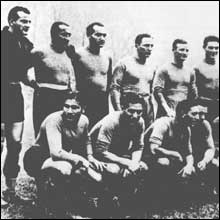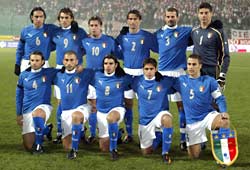
Italy History

Performing with
passion
Italy has a passion for football to rival any country in the world and Italian
football at its best is a carnival of noise, colour and, above all, style.
English origins
The origins of modern football in Italy lie with English sailors and traders who
brought the game to northern Italy in the late years of the 19th century. The
Italian Football Association was founded in 1898 and became affiliated to FIFA
in 1905. Five years later came Italy's first international match, a 6-2 victory
against France in Milan.
First trophy
The Italians took some time getting into their stride, yet by the 1930s were a
force to be reckoned with. The formation of a full national league in 1929 was a
key factor, together with the tactical innovations introduced by then Azzurri
coach Vittorio Pozzo. Inspired by the defensive excellence of the Argentinian-born
Luisito Monti and the goals of Angelo Schiavio and Giuseppe Meazza, Italy won
the FIFA World Cup on home soil in 1934, beating Czechoslovakia 2-1 in the final
in Rome.
Successful defence
After defeating Austria 2-1 to take gold at the 1936 Olympics, Italy mounted a
successful defence of the World Cup in the 1938 finals in France. Silvio Piola
struck five goals in the tournament, including two in the Italians' 4-2 success
against Hungary in the final.
Foreigners banned
Three decades would pass before Italy's next major international success. The
intervening years saw an influx of foreign imports into Serie A and the
development of the stifling defensive system of catenaccio. To remedy the
national side's underachieving ways, foreign players were banned from domestic
Italian football in 1964 - a ban which remained in place until 1980.
Slow renaissance
The benefits were not felt immediately as Italy were humiliatingly eliminated
from the 1966 World Cup by North Korea. Two years later, however, the Italians
did return to winning ways, beating Yugoslavia 2-1 in a final replay in Rome to
win the 1968 UEFA European Championship. Midfielders Gianni Rivera and Sandro
Mazzola played prominent parts in this Azzurri renaissance and, together with
prolific striker Luigi Riva (his country's all-time leading scorer), were also
involved in Italy's run to the 1970 World Cup final in Mexico where they were
beaten 4-1 by Brazil.
Third World Cup
Another defeat by Brazil meant a fourth-place finish for Italy in the 1978 World
Cup and they had to settle for fourth spot again when hosting the European
Championship two years later. Fortune favoured them, however, at the World Cup
in Spain in 1982 where they became world champions for the third time. After
scraping through the first group stage, striker Paolo Rossi hit a rich vein of
form, scoring six goals on the way to a 3-1 win againt West Germany in the
final.
Frustrating tournaments
An Italian topped the scoring charts in the 1990 World Cup too, Salvatore
Schillaci scoring six times, but Italy's campaign that year ended in tears, as
they lost to Argentina in a semi-final penalty shoot-out in Naples. More
heartache followed in 1994 as an Italy side inspired by the brilliance of
Roberto Baggio reached the World Cup final only to suffer another shoot-out
defeat, this time against Brazil.
Unhappy endings
Defeat was just as hard to bear in the final of UEFA EURO 2000™, as Sylvain
Wiltord's last-minute equaliser and then David Trezeguet's extra-time goal saw
France triumph at Italy's expense. The 2002 World Cup was just as painful as
Italy bowed out to co-hosts the Korean Republic. Better things will be expected
at UEFA EURO 2004™.
Country Info

Fresh Roman
conquests?
AREA: 301,230 sq km
POPULATION: 57,998,353
NEIGHBOURS: Austria, France, Holy See, San Marino, Slovenia, Switzerland
LANGUAGES: Italian
CAPITAL CITY: Rome
Once home to the Roman Empire - arguably the most influential empire in human history - Italy only became a united nation in 1861, but its culture and art throughout the ages have dazzled the rest of Europe every bit as much as Italian football enthrals modern supporters.
Roman glory
While Etruscan tribes had dominated the Italian peninsula as early as 1200 BC,
it was the magnificent Roman empire, founded in 509 BC, that was to spread the
glory of the region across the globe.
Great empire
Boasting a culture, political structure and infrastructure far advanced of
anything else in Europe, Rome was to tower over territories as far afield as
England, Spain and Iraq before the mighty empire eventually crumbled under the
weight of in-fighting and attacks from Gothic tribes.
Renaissance wonder
The Dark Ages came upon Europe as Lombards, Franks, Saracens, Germans and
Normans invaded the peninsula and the learning of Rome disappeared from view,
only to re-emerge with the remarkable cultural achievements of Italy's city
states during the European Renaissance of the 14th and 15th centuries.
Waning power
However, while the ideas revived by the Renaissance were to dictate the
direction of the whole continent, Italy waned in the following centuries, and it
was only with reunification that the nation once again became a political force.
Footballing splendour
Italian football, meanwhile, has arguably had an equally significant impact
on the world game. The sport had been played in some form during the
Renaissance, but its reintroduction in Turin saw Italians make the British game
their own.
International success
Winning their first international 5-2 against France on 15 May 1910, Italy
has subsequently cast a huge shadow over European football, winning the 1934,
1938 and 1982 FIFA World Cups and reaching the final in 1970 and 1994, and
enjoying success in the UEFA European Championship of 1968.
Italian mastery
With club sides AC Milan, Internazionale FC and Juventus FC, skilful
attacking play and effective defending have seen the football from the heart of
the old Roman empire conquer Europe again.
Today year 2004 Italy team

Player name list
|
|||||||||||||||||||||||||||||||||||||||||
| Group C | |||||||
| PLD | W | D | L | GS | GA | PTS | |
|
|
3 | 1 | 2 | 0 | 8 | 3 | 5 |
|
|
3 | 1 | 2 | 0 | 4 | 2 | 5 |
|
|
3 | 1 | 2 | 0 | 3 | 2 | 5 |
|
|
3 | 0 | 0 | 3 | 1 | 9 | 0 |